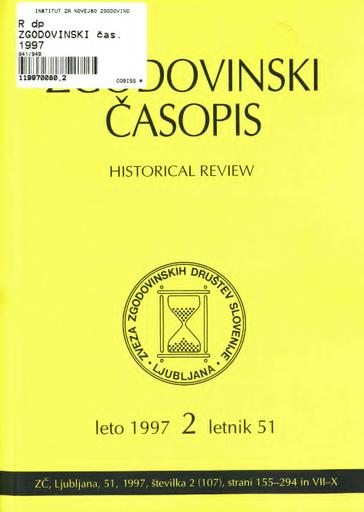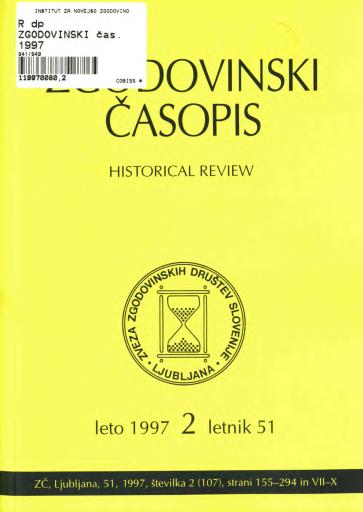
/
Periodicals
/
Zgodovinski časopis
Dr. Gregorius Carbonarius (Oglar, Voglar) de Wiesenegg (1651-1717) - a Doctor and a Diplomat

Author(s):Peter Borisov
Co-author(s):Vasilij Melik (odg. ur.)
Leto:1997
Publisher(s):Zveza zgodovinskih društev Slovenije, Ljubljana
Source(s):Zgodovinski časopis, 1997, št. 2
Language(s):slovenščina
Type(s) of material:text
Files (1)

Name:ZGODOVINSKI_CASOPIS_LETO_1997_LETNIK_51_STEVILKA_2.pdf
Size:6.61MB
Format:application/pdf
Permanent link:https://hdl.handle.net/11686/file163
Description
Dr. Gregorius Carbonarius worked as magister sanitatis in Radgona (Radkersburg), successfully battling the plague until 1687 when he went to Russia where he became personal doctor to Czar Peter the Great in 1688. He accompanied the Czar on his journeys West and took part in many battles. In 1700 the Swedes captured him at Narva and imprisoned him until 1704. Dr. Carbonarius was sending secret messages to the Russian government on the movements and man-power of the Swedish army until he was set free in 1704 upon the intervention of Emperor Leopold I. Czar Peter the Great appointed him Government Secret Councillor, and he was made knight by the Austrian Emperor. At the end of 1715 Carbonarius left Moscow, took ill on the journey, and died in his home at Naklo (Slovenia) in 1717.
Metadata (11)
- identifierhttps://hdl.handle.net/11686/14925
- title
- Dr. Gregorij Karbonarij (Oglar, Voglar) de Wiesenegg (1651-1717) - zdravnik in diplomat
- Dr. Gregorius Carbonarius (Oglar, Voglar) de Wiesenegg (1651-1717) - a Doctor and a Diplomat
- creator
- Peter Borisov
- contributor
- Vasilij Melik (odg. ur.)
- subject
- biografije
- Karbonarij, Gregorij de Wiesenegg
- Voglar, Gregorij
- Oglar, Gregorij
- description
- Dr. Gregorius Carbonarius worked as magister sanitatis in Radgona (Radkersburg), successfully battling the plague until 1687 when he went to Russia where he became personal doctor to Czar Peter the Great in 1688. He accompanied the Czar on his journeys West and took part in many battles. In 1700 the Swedes captured him at Narva and imprisoned him until 1704. Dr. Carbonarius was sending secret messages to the Russian government on the movements and man-power of the Swedish army until he was set free in 1704 upon the intervention of Emperor Leopold I. Czar Peter the Great appointed him Government Secret Councillor, and he was made knight by the Austrian Emperor. At the end of 1715 Carbonarius left Moscow, took ill on the journey, and died in his home at Naklo (Slovenia) in 1717.
- Dr. Gregorij Karbonarij je do 1687 deloval v Radgoni kot magister sanitatis in uspešno zatiral kugo, nakar je odpotoval v Rusijo in bil kot edini Slovenec v zgodovini od 1688 osebni zdravnik carja Petra Velikega. Spremljal ga je na popotovanjih po Zahodu in se udeležil mnogih bitk. Švedi so ga 1700 ujeli pri Narvi; iz taborišča je pošiljal ruski vladi tajna poročila o gibanju in številčnosti švedske vojske. Na intervencijo cesarja Leopolda I. je bil 1704 izpuščen in car Peter ga je imenoval za vladnega tajnega svetnika, avstrijski cesar pa ga je povišal v plemiški stan. Konec leta 1715 je Karbonarij odpotoval iz Moskve, na poti je zbolel in 1717 na svojem domu v Naklem pri Kranju umrl.
- publisher
- Zveza zgodovinskih društev Slovenije
- date
- 1997
- type
- besedilo
- language
- Slovenščina
- isPartOf
Citirano v (1)
| Tipologija | Avtor(ji) | Naslov | Kraj | Založba | Leto |
|---|---|---|---|---|---|
| 1.01 Izvirni znanstveni članek | Kambič, Marko | Habsburški mejni kordon proti Osmanskemu cesarstvu kot branik zdravja in njegove kazenskopravne osnove | Ljubljana | Inštitut za novejšo zgodovino | 2024 |